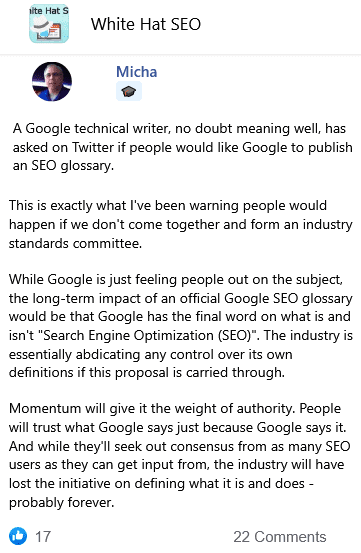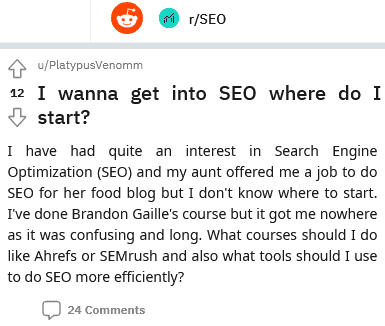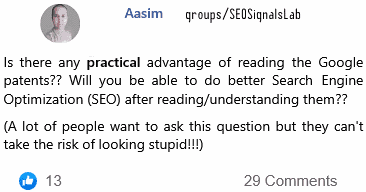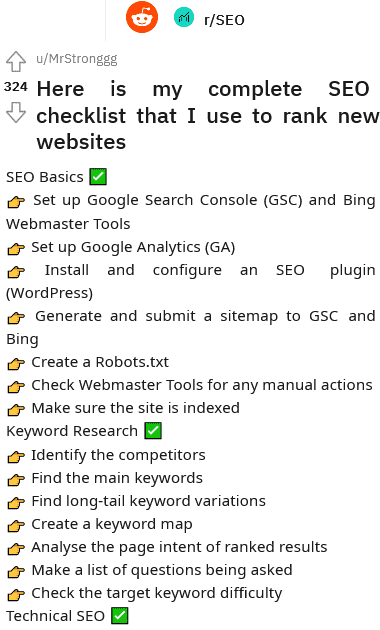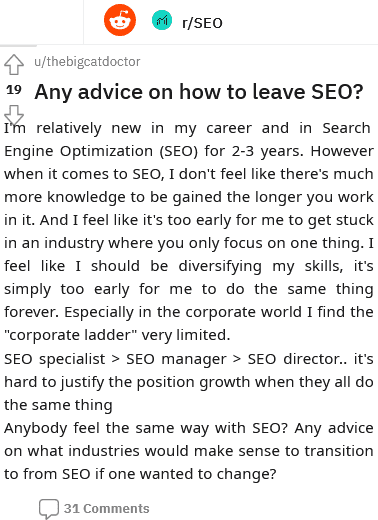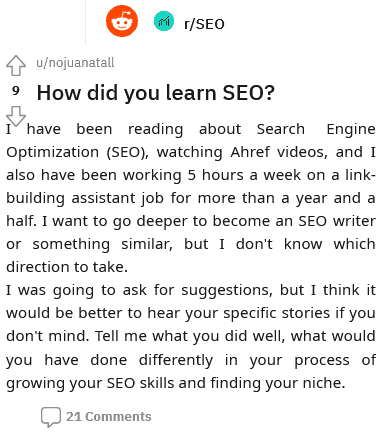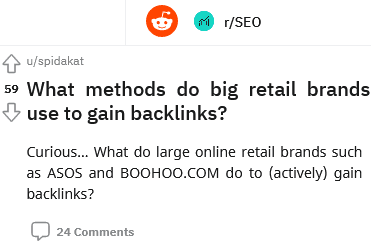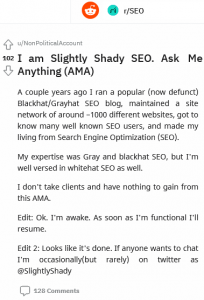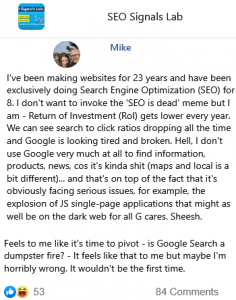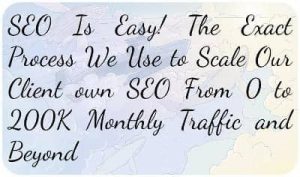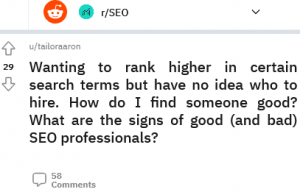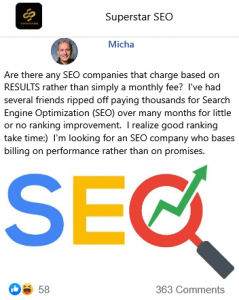A Google technical writer, no doubt meaning well, has asked on Twitter if people would like Google to publish an SEO glossary.
This is exactly what I've been warning people would happen if we don't come together and form an industry standards committee.
While Google is just feeling people out on the subject, the long-term impact of an official Google SEO glossary would be that Google has the final word on what is and isn't "Search Engine Optimization (SEO)". The industry is essentially abdicating any control over its own definitions if this proposal is carried through.
Momentum will give it the weight of authority. People will trust what Google says just because Google says it. And while they'll seek out consensus from as many SEO users as they can get input from, the industry will have lost the initiative on defining what it is and does – probably forever.
17 👍🏽17
22 💬🗨
📰👈
Is the concern that Google will purposefully mislead or that things change rapidly that the glossary will not stay up to date?
Nope. The concern is that people don't understand what it means to collectively cede the initiative on an important foundation to a single corporation.
If Google creates a glossary, it WILL become the de facto standard for everyone despite any reservations or disclaimers Google shares. And you will have to live with whatever definitions Google chooses. People will complain about Google taking control over the terminology.
I guarantee you that will happen. It's what always happens.
One possible long-term consequence of Google creating the glossary would be that they eventually open-source it. But there's no guarantee they would do that.
And while it's fair to say there is no guarantee they'll create the glossary, people really need to acknowledge the implications of what such a Google SEO glossary would be.
I've been calling for the formation of a standards committee for over 10 years and people keep burying their heads in the sand.
If we don't regulate ourselves (starting with glossaries), regulation will be handed to us.
Adopting standards doesn't mean everyone has to start passing certification tests. It means the industry agrees on a set of baseline concepts and definitions that level the playing field for everyone.
Future customers and employers will be able to understand what the heck we're talking about.
It will be easier to train new SEO specialists.
Right now it's the Wild West and Every SEO for Him/Herself. And people have no idea of how to set expectations.
Mat
I'm interested in helping connect the dots to see if we can make an association or organization come out of this to where content and tool providers look past their profits for a moment and put together something for the greater good of the industry.
When you say put their head in the sand, is it because they don't want to participate or just simply don't want to lead the charge?
Micha ✍️ 🎓 » Mat
They don't see the need for standards because they can define their own terms and "go their own ways".
But that will change if Google creates the standards by default with their own glossary.
I'm not saying Google wants to do this or has any nefarious intention. But they're Google. It will simply become the standard if they create the glossary.
Ammon Johns 👑 » Micha
I've been down that road a few times over the years. Starting with an initiative called AIMpro (Association of Internet Marketing Professionals) in the 90s and ending with my being on the working party to form SMA-UK in the mid noughties after seeing so many flaws in SEMPO.
It's way, way beyond something simply like herding cats.
Turns out the only thing we are more against than Google determining what is or is not SEO, and how it should or should not be presented, is other SEO users determining the same. 😃
Micha ✍️ 🎓 » Ammon Johns
I'm afraid it's going to take a slew of job postings where requirements include "Certified to Google SEO standards" before people understand what this is all really about.
It won't be Google demanding those certifications. It will be employers and potential customers. They'll use certifications as a quality test.
If the industry were to set up its own standards board, it could write into the standard that certifications are not required as long as all parties to an agreement accept the standards.
Of course, one benefit to adopting standards is that certification tests must then adhere to those standards or they won't be deemed valuable.
As it is, the SEO industry has many certifications that are not written to any community standards – because there are no standards.
Ammon Johns 👑 » Micha
Oh I get it, Michael. I made these exact arguments back in the 1990s.
AIMpro had the most open and all-inclusive definitions we could create and fell apart to internal disagreements. SEMPO, well, I think you remember the real agenda of SEMPO as well as I do. SMA-UK same thing. People just can't resist using the legitimacy of any sort of 'standards' to boost their own value, and bash anything they personally don't like. There were a couple of others between those.
Search Engine Optimization (SEO) is a field that tends to attract those who prefer to act as lone wolves, who see any system as something to examine, subvert and exploit, and as the exodus to blogs from forums showed very clearly, will always put self-interest above the common good.
📰👈
Iannone
Can you explain why it matters if terms are defined or not? How would it effect someone doing Search Engine Optimization (SEO)
A common vocabulary helps everyone understand what the conversation is about.
This is important for people negotiating contracts with clients and employers.
It's important for people who are just learning about search engine optimization.
It's important for people who work with SEO tools.
Right now, everything is confused because of competing definitions. We SHOULD have a standard glossary. I'm just saying (and have said for over 10 years) that it shouldn't be Google who creates that glossary.
Paul
Who should do it then? You said you tried and failed with other SEO users. Who should we be asking to set it up – maybe a leading university?
Micha ✍️ 🎓 » Paul
It should be done by the SEO industry. However, it's most likely going to be done by someone outside the industry – maybe Google, maybe not.
There's already a company called Stukent that is developing and selling digital marketing courseware to universities. They've partnered with a couple of SEO users (Dr. Scott Cowley and Steve Wiideman) to distribute an SEO textbook to their educational clients. So maybe Stukent will create the de facto standard.
It doesn't matter. If a standard emerges without the knowledge and participation of a majority of SEO providers, it will eventually lead to legal problems for some people – and unhappy conversations with clients or employers for many.
It's avoidable to a certain extent. But as others have pointed out, this industry is filled with people who want to go their own way. It would be a contentious process to create a proper standard. Still, I'm willing to go through it if enough other people join the band.
Micha ✍️ 🎓
Search Engine Optimization (SEO) is not and never has been about Google. While there are some people whose SEO work focuses on Google, there are many of us who must look at the larger picture.
Site search is an important piece of the puzzle for anyone doing ecommerce or who works on a large Website (even affiliate sites).
But social media search is also important.
Then there are international sites that need to worry about Baidu (Chinese search), Yandex (Russian search), Voila (French search), Naver (Korean search), and Yahoo Japan (to name just a few of the non-Googley international search platforms).
Even if we disregard the differences between non-English and English-based search engine optimization, Google isn't the only platform on the Web. To defer to Google's judgments about what SEO is and does is dangerous because they're only going to see things from their own perspective.
Thies
They should give us their definitions. We don't want to know?
I had to correct their original definition on what a doorway page is.
Personally, I'd rather not have to do that again for a plethora of terms. I realize other people would also jump on them for providing an incorrect defintion, but not everything would be as clear-cut as "doorway page".
People also used to mess up the definition of "link farm". I don't recall if Google was among them (it may have been). Things began calming down after I fixed the Wikipedia article.
Thies
if they get it wrong, isn't it worth knowing that?
Micha ✍️ 🎓 » Thies
I don't know. It's not like every team at Google shares the same vocabulary. So I'm not concerned about what Googlers think various SEO terms mean.
I'm concerned about what people might think they've learned from a Google SEO glossary.
📰👈
What is PageRank? Is it the same as Backlink Juice or Link Equity? PageRank was a Patent Created by Google’s Founders
Doesn’t Google implement anything in SEO that wasn’t mentioned in the Patent?
Google uses Natural Language Processing (NLP) instead of Latent Semantic Indexing (LSI) due to Both Different Patent Owners
Google SE Update and Websites that Didn’t Build New Backlinks
Does Google Usually Crawl Text Content of an URL first and delay Indexing it?
Ammon: Google don’t Care about Silos, or Pages Only Linking to Other Pages on the Same Topic, Same Website
Google PageSpeed Insights and Core Web Vitals (CWV)
Are Keywords You Mean Valuable in Google First Search Result Page?
Strategy to offset the new Google Update that works Positively
Can Content that gets Written by Artificial Intelligence (AI) Win In Google SERPs?
Ammon: Google don’t count Words or Keywords, but they count Page Speed
Does Google Penalize Duplicate Content?
Does Google Crawl and Index Users Generate Content Sites like Quora and Medium Easier than Yours?
Does the Search Engine Sandbox not Exist?
